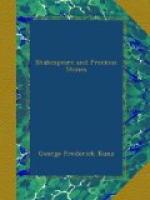TO THE IDOL OF MINE EYES AND THE
DELIGHT OF MINE
HEART,
ANNE HATHAWAY
Would ye be taught,
ye feathered throng,
With love’s
sweet notes to grace your song,
To pierce the
heart with thrilling lay,
Listen to mine
Anne Hathaway!
She hath a way
to sing so clear,
Phoebus might
wond’ring stop to hear;
To melt the sad,
make blithe the gay,
And nature charm,
Anne hath a way:
She
hath a way,
Anne
Hathaway,
To breathe delight
Anne hath a way.
When envy’s
breath and rancorous tooth
Do soil and bite
fair worth and truth,
And merit to distress
betray,
To soothe the
heart Anne hath a way;
She hath a way
to chase despair,
To heal all grief,
to cure all care,
Turn foulest night
to fairest day:
Thou know’st,
fond heart, Anne hath a way,
She
hath a way,
Anne
Hathaway,
To make grief
bliss Anne hath a way.
Talk not of gems,
the orient list,
The diamond, topaz,
amethyst,
The emerald mild,
the ruby gay;
Talk of my gem,
Anne Hathaway!
She hath a way,
with her bright eye,
Their various
lustre to defy,
The jewel she
and the foil they,
So sweet to look
Anne hath a way.
She
hath a way,
Anne
Hathaway,
To make grief
bliss Anne hath a way.
But were it to
my fancy given
To rate her charms,
I’d call them Heaven;
For though a mortal
made of clay,
Angels must love
Anne Hathaway.
She hath a way
so to control
To rupture the
imprisoned soul,
And sweetest Heaven
on earth display,
That to be Heaven
Anne hath a way!
She
hath a way,
Anne
Hathaway,
To be Heaven’s
self Anne hath a way.
This little poem is by Charles Dibdin (1748-1814), the writer of about 1200 sea-songs, at one time great favorites with sailors. It appeared, in 1792, in his long-forgotten novel, “Hannah Hewit, or the Female Crusoe”, and Sir Sidney Lee conjectures that it may have been composed on the occasion of the Stratford jubilee of 1769, in the organization of which Dibdin aided the great actor, David Garrick. In the “Poems of Places”, New York, 1877, edited by Henry W. Longfellow, this poem is assigned to Shakespeare on the strength of a persistent popular error.[14] In his “Life” Dibdin says: “My songs have been the solace of sailors in their long voyages, in storms, in battle; and they have been quoted in mutinies to the restoration of order and discipline”. It has been asserted that they brought more men into the navy than all the press gangs could do.
[Footnote 14: Sir Sidney Lee, “A Life of Shakespeare”, new edition, London, 1915, p. 26, note.]




